Meet the Children of Unicorns: A Challenge to Learn, Reflect, and Disrupt
Whether you consider yourself straight and 100 percent hetero-normative, or whether you consider yourself a mere being in a complicated cosmos whose physical manifestations bear little to no weight on who you instinctively gravitate toward when seeking a partner, or whether you consider yourself to be utterly and totally devoid of any and all sexual attraction or attractiveness, you would be hard-pressed to discover something that can bridge those divides – a hypothetical “God particle” that could universalize our opinion and understanding of sex and gender in relation to the family unit.
Now, this need looms ever more important as many are concerned that recently obtained rights may be nullified – that years of hard work, activism, and conversations will be moved backward in time. So, when you next find yourself confronted with hatred, bias, or misunderstanding, perhaps some of the responses below will come to mind. Perhaps the voices of children, even adult children, can be a source of deeper understanding and a path to that unifying, warm, squishy center. As so it so often goes, by only listening to those at the margins, could we hope to understand the power and the unifying force of love and to rediscover the best parts of what it means to be human.
Last month we explored the editor’s note in Frank Lowe’s edited collection of stories in Raised by Unicorns: Stories from People with LGBTQ+ Parents (Cleis Press, June 2018). Following Frank’s mission to provide readers with a diverse array of stories, we wanted to chat with some of the contributors to provide more insight into their experiences. Presented with five somewhat rudimentary and predictably-answerable questions, we were very much surprised to discover a much deeper underlying message—one of hope, growth, understanding, and most importantly love.
(Please note that this interview was conducted prior to some of the more recent threats against LGBTQ+ rights in America and abroad. Contributors to Raised by Unicorns vary in age from 15 to 47. Ages are noted after contributor names.)
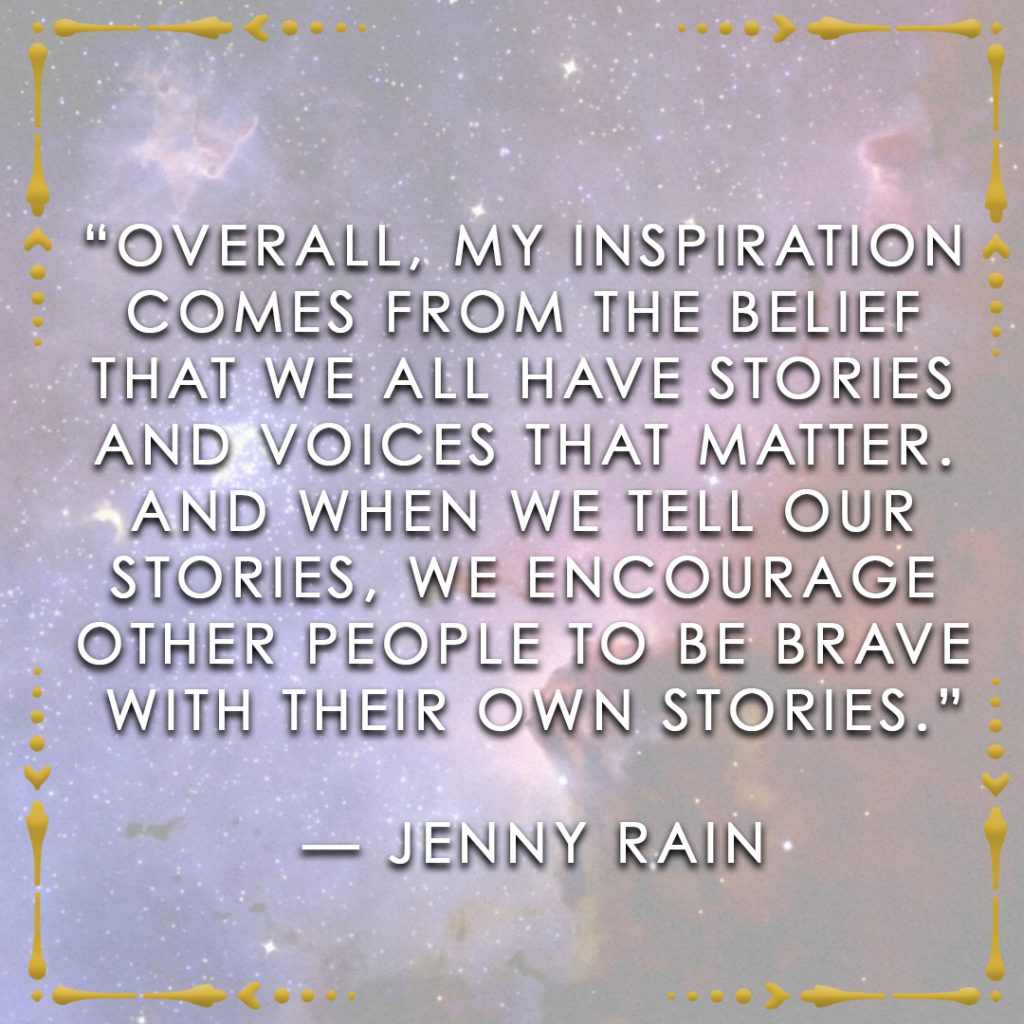
1. What inspired you to write your chapter and share your story?
MIKAYLA DENAULT (15): The need for awareness. I seized this opportunity to show how the obstacles my family faces make us stronger in the face of adversity. The main goal of my chapter, “Two Hens and a Chick”, is to erase the line between LGBT and straight families. I want to show everyone that as long as there is love, a family is a family despite small differences that makes us unique and give us a diverse world. My chapter highlights the experiences I have encountered such as my moms’ wedding and the legalization of same-sex marriage in my state. So, overall, the inspiration behind my chapter was to share my perspective in a family with two moms, and how moments in my life motivated me to fight injustices in society and bring about equality.
LARA LILLIBRIDGE (44): Although I just published a memoir about my experiences growing up in a lesbian home (Girlish, Skyhorse 2018) there is such little representation for children of LGBTQ+ families that I was super excited to add to the body of literature.
I came of age in the late 1980s, and knew next to no other children with families like mine. Meeting other children of LGBTQ+ families feels more like meeting long-lost cousins than meeting strangers. So, often, children of the queer community feel as if we are poster children for our entire subculture: what we say about our families will be used by others to represent queer families as a whole. The best way to be seen as individuals is to have more representation in TV movies, and in books like Raised by Unicorns.
JENNY RAIN (47): Growing up as the child of two dads in the 70s, 80s, and 90s, my story finds itself firmly placed between the intersection of the church and the LGBTQ+ community. I love both. I believe both communities can not only learn to co-exist, but to also thrive together. I believe that every child of an LGBTQ+ parent, every LGBTQ+ family, and those who are attempting to find communities of faith have an important story to add to the changing conversation in our nation. I believe that my story can make a difference.
My life’s passion is all about how to change the conversation for LGBTQ+ families like mine both in our churches and in this religiously-motivated world. But, my ultimate goal is to see our nation elevate beyond the partisan and theological conversations around LGBTQ+ families to be less combative and more redemptive. Frank has given me the incredible opportunity to start doing that.
Overall, my inspiration comes from the belief that we all have stories and voices that matter. And when we tell our stories, we encourage other people to be brave with their own stories.
KELLEN KAISER (36): My whole life people have asked me what it was like growing up with lesbian moms. It’s such a gigantic question to consider. I find it easier to narrow in on what a particular moment or experience was like for me. I actually wrote another book a couple years ago, Queerspawn in Love, that focused on a relationship I had for five years in my twenties. I realized after finishing that book that there was still a lot left to explore from earlier parts of my childhood that might be of interest to people. In this case, kindergarten and my parent’s wedding. Writing this, I reflected on how central that time was, both in the creation of my family and in how I interacted with others around my family.
KATE HILLYER (43): First, there aren’t all that many of us who grew up with LGBTQ+ parents, particularly from my generation, so it is important for us to share our experiences. Second, a middle grade novel I am writing has a main character with two moms, and I knew it would be a good way for me to get back in touch with what it was like when I was growing up. I was right; the writing experience was both illuminating and cathartic for me.
PERSIS TICKNOR-SWANSON (21): My mother’s partner encouraged me to write my story because she recognized how unusual my family’s experience was. I sometimes forget that to outsiders my family’s history is interesting or confusing, because to me it’s just my life. But I’d also been thinking for a while that the voices of children of LGBTQ+ families to be included in the narrative of LGBTQ+ experience. We are a growing demographic and the diversity and volume of our stories is important to the equal rights movement. And I’d felt like there wasn’t really a place for me in the LGBTQ+ movement. “Ally” seemed too distant and didn’t encapsulate the depth of my experience. This book has given me a way to express what it has meant to me to be raised by a queer mom and to feel simultaneously unique and part of a group.
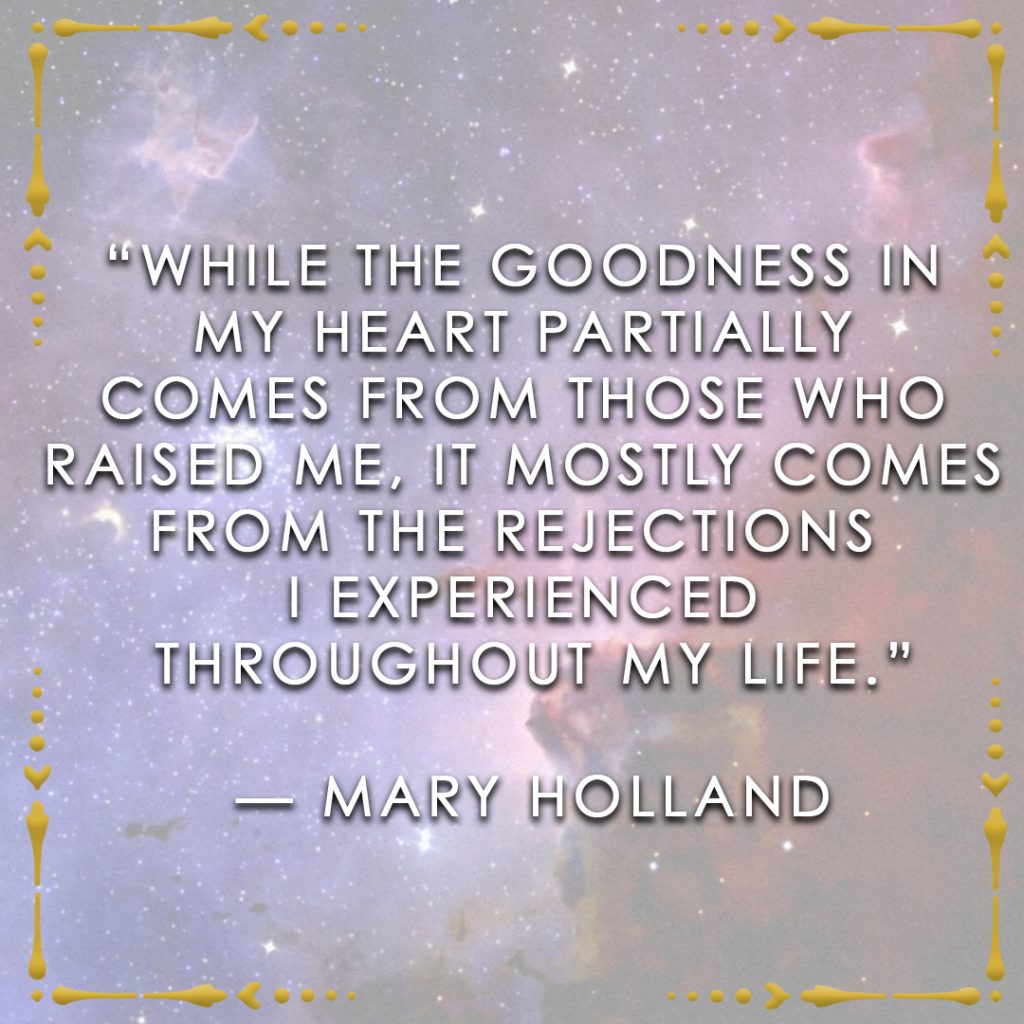
2. Were there any surprises or startling revelations about what it is like being “Raised by Unicorns?”
JENNY RAIN (47): First, the fact that the closeness of my relationship with my biological father is no different because he is gay. If he were straight, bisexual, transgender, a person of color, able-bodied, or disabled… none of those labels matter when you are family. Society tells you those labels matter, but they don’t.
Second, gender matters little when it comes to parenting. I know the conservative right will rail against this comment, but I have lived this experience. The roles (nurturer and protector) that my parents have played have been more important to my upbringing. Typically, the male is seen as the protector and the female as the nurturer. But to universalize this and say that a child is only healthy if they are raised by a man AND a woman is to substitute gender identification for roles— and I think that is a mistake. I’ve seen lots of heterosexual couples where the woman is the protector and the man is the nurturer. I’ve also seen same sex couples where both parents play both roles. As long as these roles show up in some sort of a parenting combination, the child is going to be healthy and happy.
Third, being the child of two dads, the Christian church has most definitely been the hardest place to feel safe… This is the antithesis of what should be. Jesus was at heart a countercultural force. He was kicked out of prevailing religious circles because of his habit of reaching out to those on the margins. I am a person who is on the margins of the margins. I AM the person that Jesus would have reached out to, as are my dads. Yet, we are rejected by churches, shunned, and even cast aside as immoral, defective, and abominations (yes, I get lumped into that category, too).
MARY HOLLAND (27): Honestly, writing out my own story had me reflecting more on my experiences as a child and just how much they effected me for the better. I realized that while the goodness in my heart partially comes from those who raised me, it mostly comes from the rejections I experienced throughout my life.
EMILY GRUBBS (21): I remember growing up and being surprised to learn that being LGBTQ+ was, and still is, considered “wrong” by many. My moms raised me to love everyone and have love left over for myself. It was shocking to learn that other children had not been raised in the same way I was. I had to learn that being a queer woman meant facing discrimination, because in our home we never discriminated. As a child I felt like my family was normal, what was shocking is that others thought we were so different.
KELLEN KAISER (36): I was surprised by how emotional I got reading the other chapters. I had expected to enjoy it, but there was something so deeply resonant about finding commonality that caught me off guard. As much as I have understood that there’s a shared culture we Queerspawn have, it is beautiful to see its complexity manifest. After many years of feeling different from others and often alone, it’s healing to feel a part of a tribe.
KATE HILLYER (43): It surprised me to realize how early I had begun to direct conversations in a way to avoid having to reveal that I had two moms. It’s something that a lot of closeted LGBTQ+ people do. I started that in about fourth grade.
PERSIS TICKNOR-SWANSON (21): Some of the surprise is how entirely normal it is. My mom is my mom. She’s also queer, but she is still a mom. So much of my family life is like the stereotypical hetero family: we argue, joke, play, and cuddle. But there are underlying themes of acceptance, openness, and difference in my family with both positive and negative implications. Our backyard BBQs feature mostly lesbian couples and 90s gay dance club music. My mother sometimes gets nasty or judgmental comments from people for her genderqueer appearance. I don’t blink an eye at women kissing women. I feel like I was given all the great things any child would be given by a loving healthy family with the addition of some amazing things only a kid with LGBTQ+ parents would have (like going to gay drag clubs with my mom).
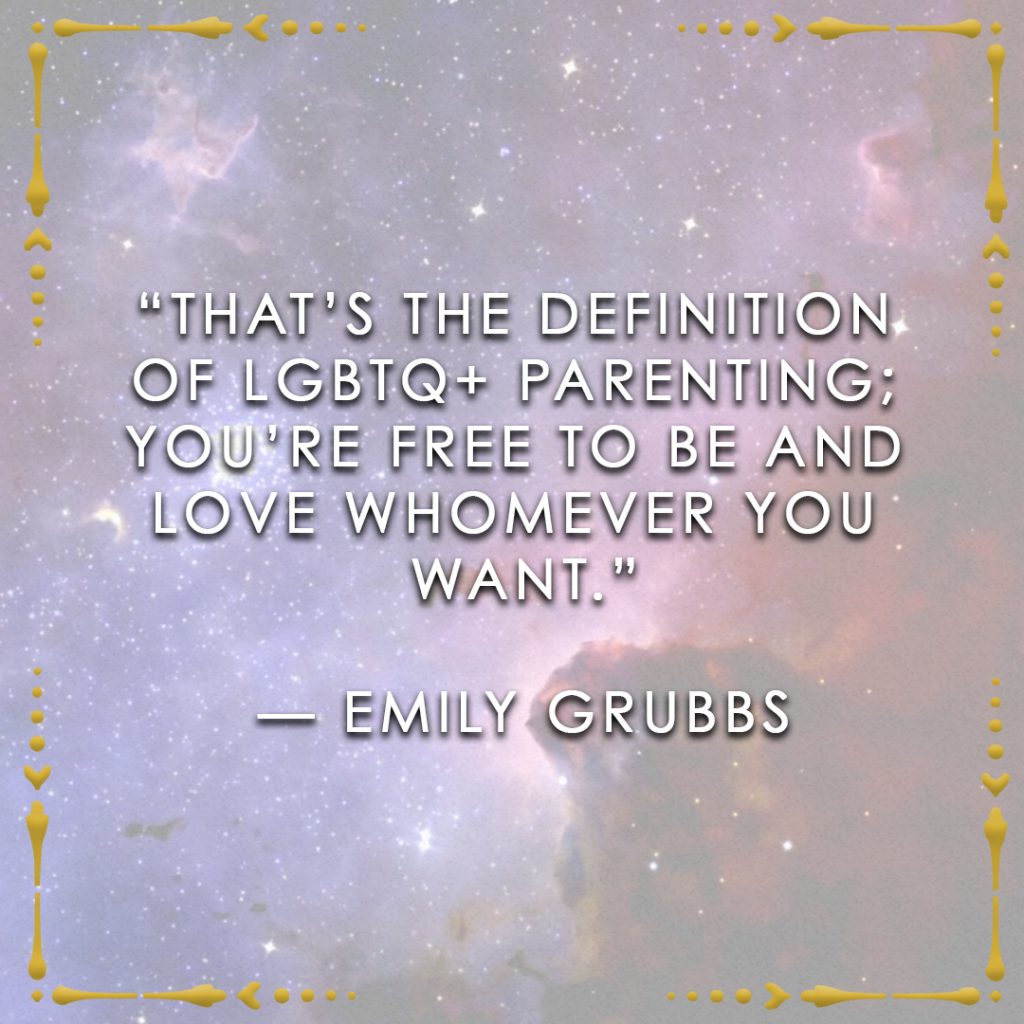
3. What was the most defining moment for you as being “Raised by Unicorns”?
MIKAYLA DENAULT (15): My most defining moment being “Raised by Unicorns” is the receiving the encouragement from my parents to be whoever and whatever I want. My dreams and aspirations have been celebrated and cherished by my family, and I believe this is because they never want me to have the backlash they received from being different.
EMILY GRUBBS (21): This is a tough question! I think the moment it became clear to me what being raised by two moms really means is when I finally accepted my own queer identity. I write in my chapter about my struggles trying to come out as bisexual in high school. However, once I got to college, I started exploring partners of all genders and started to embrace my own queer identity, away from the protection of my parents. I remember “coming out” to my parents my sophomore year of college. I had a partner visiting me at home for the first time and my parents were thrilled. Up to this point, everyone in my family had only known me to be straight. It was not until my new companion was just a few minutes away from out house that I revealed she was a woman. My moms were surprised, but needed no time to accept me—they simply greeted my guest with warm hearts. That’s the definition of LGBTQ+ parenting; you’re free to be and love whomever you want.
KELLEN KAISER (36): Probably being taken out of math class in 7th grade to go speak on CNN about the Sharon Bottoms case one day in 1992. It was a quintessential “Queerspawn as spokesperson” moment. So often we are asked as young people to represent and defend our families and communities.
KATE HILLYER (43): I went to Smith College, and after a childhood of hiding or obfuscating, I was suddenly thrust into a world where having two moms was something to be celebrated. It was like shedding my skin, a rebirth into the open.
PERSIS TICKNOR-SWANSON (21):I am not sure I have a “most defining moment” because I feel like there are so many moments with my mom that have shaped me. Honestly, writing my piece for the book was an important moment for me as a child of a queer mom. Reflecting on my experiences and turning a critical eye on my childhood, helped illuminate just how special and formative it was to be “raised by unicorns”.
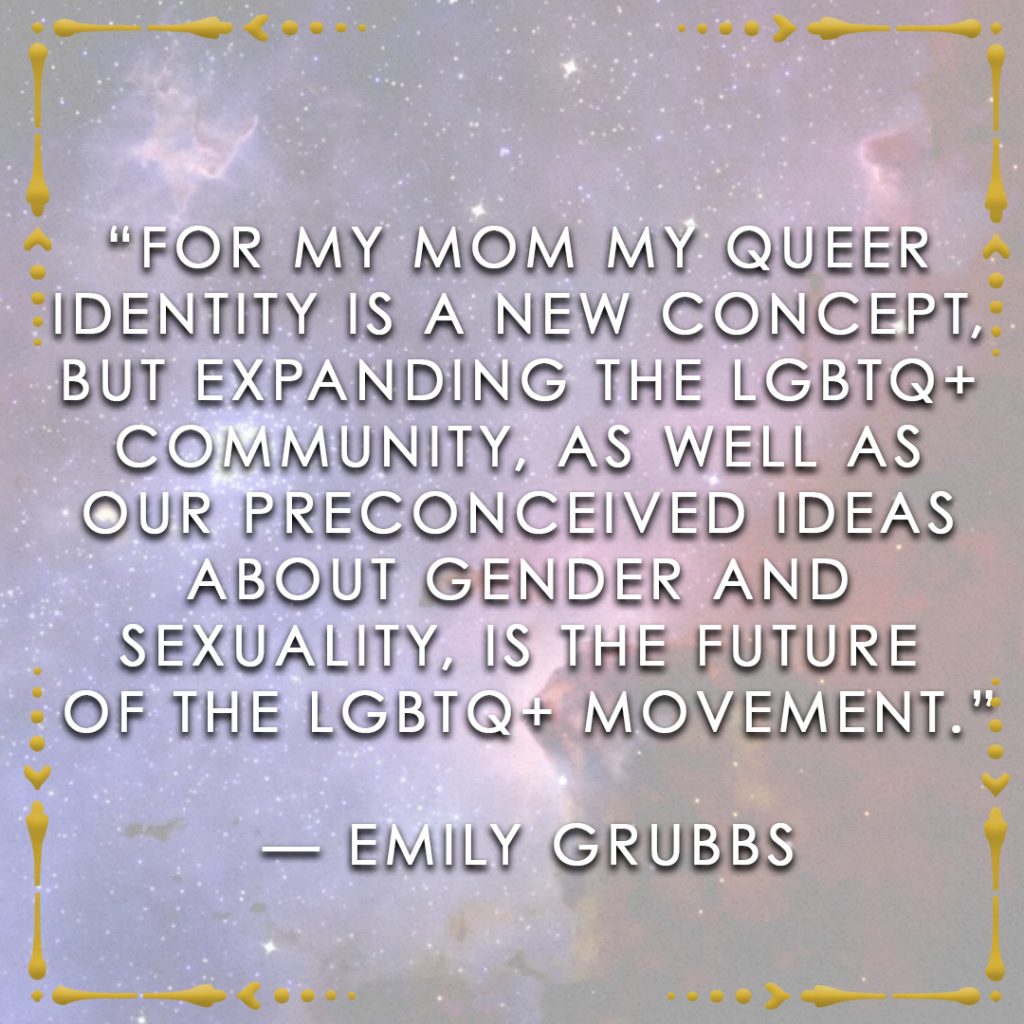
4. What changes do you expect to see in the next 5 to 10 years?
MIKAYLA DENAULT (15): I expect more equality to be reached, and I am hoping that conversion therapy will be obsolete. I expect more acceptance, as well. (A new study by J. Walter Thompson Innovation Group states that only 48 percent of 13-20 year olds identify exclusively as heterosexual.) The world is changing, so with policy changes and spreading love, perception of LGBTQ+ families will have to move with this change.
JENNY RAIN (47): My hope is that we will see the normalization and acceptance of LGBTQ+ people and families. I say “normalization” because right now, we live in an overtly hetero-normative, cis-gender, patriarchal society that runs counter to the realities that many in the LGBTQ+ community are experiencing. Millennials and Gen Z’s are breaking stereotypes, norms, and the binary boxes that we have placed people into. They are disrupting the narrative and owning their place in the rainbow of what it means to be human and it’s beautiful.
MARY HOLLAND (27): I expect to see a more global level of acceptance and understanding. I hope that the stigma behind LGBTQ+ people will diminish greatly regarding discrimination against them in their daily lives.
EMILY GRUBBS (21): I have noticed that the LGBTQ+ movement is constantly evolving and becoming more nuanced. I predict that over time more people will start to identify with the LGBTQ+ movement as labels become more inclusive. My mom, Lisa, asked me the other day what I mean when I refer to myself as “queer”. She explained that when she was growing up “queer” was used exclusively as a slur. I explained to her that, to me, being queer means rejecting socially constructed ideas about gender and sexuality. Although I personally feel proud to biological female, my gender identification is not simply masculine or feminine. Furthermore, gender does not determine who I date, I base my relationships on connection; male, female, trans, non-binary, I can get down with any kind of person. To my mom my queer identity is a new concept, but expanding the LGBTQ+ community, as well as our preconceived ideas about gender and sexuality, is the future of the LGBTQ+ movement.
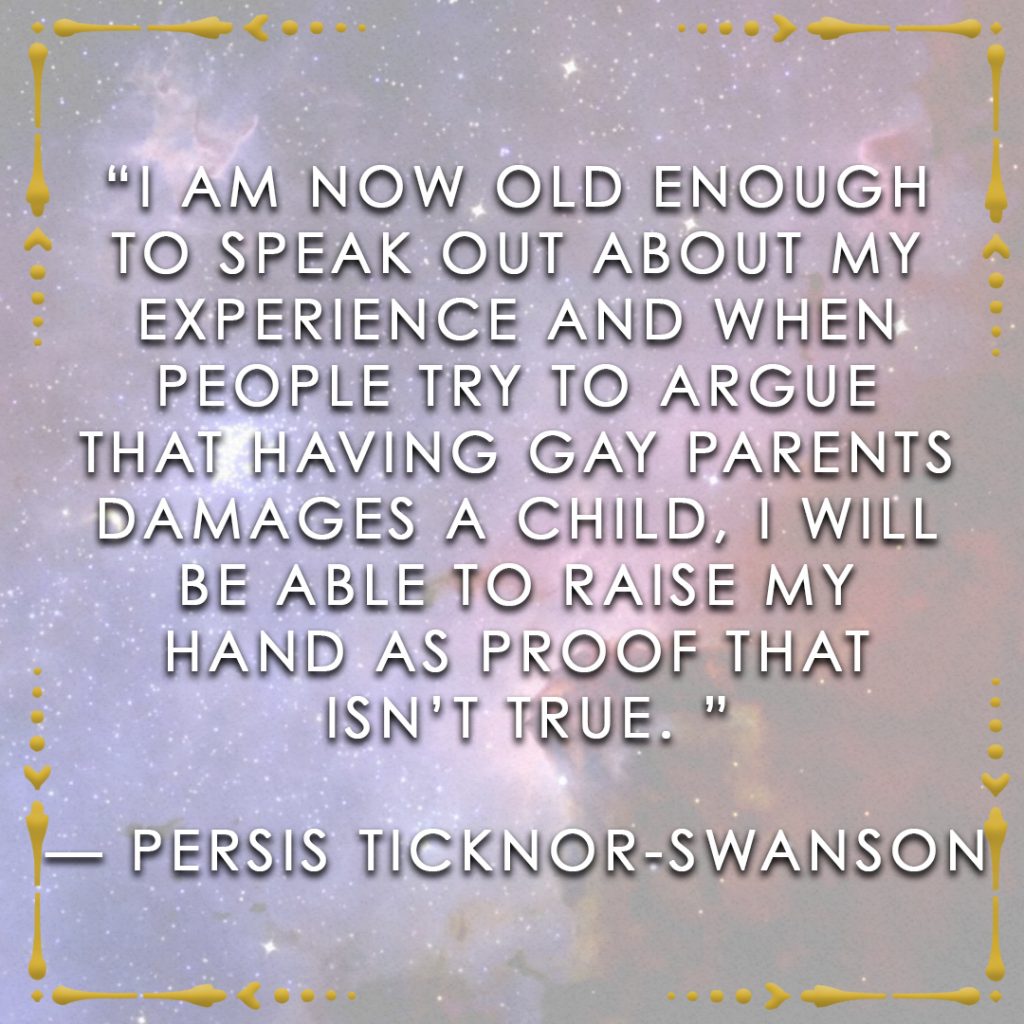
KELLEN KAISER (36): I’m not ready to fortune-tell about what will happen, but I’m happy to put forth what I want to occur. I want more laws and policy in place to protect and recognize our families. I want more representation of families like ours in media (for us and by us) and in the educational system. I want the Queer community to acknowledge our unique role, even as adults, and embrace us. I want the destruction of patriarchy and white supremacy to hasten further.
KATE HILLYER (43): I have been amazed at the pace of acceptance. When I was in college, I didn’t think I’d see marriage equality in my lifetime. At that time, Vermont became the first state to pass a domestic partner law, and lawmakers had people pelting their cars with rocks. In Vermont! I know that right now is tough because of the recent Masterpiece Cake decision, and because of the rise in violence against LGBTQ+ people, but I also know that as a community, adversity makes us stronger. I think the next 5 to 10 years are going to bring greater acceptance and embracing of the variety of gender identities and sexual orientations.
PERSIS TICKNOR-SWANSON (21): So many more kids with LGBTQ+ parents. At my baby sister’s first birthday most of the queer couples there either had babies or were planning on having them. That means there is going to be a whole demographic of people who can be advocates for the “gay lifestyle”. I am now old enough to speak out about my experience and when people try to argue that having gay parents damages a child, I will be able to raise my hand as proof that isn’t true.
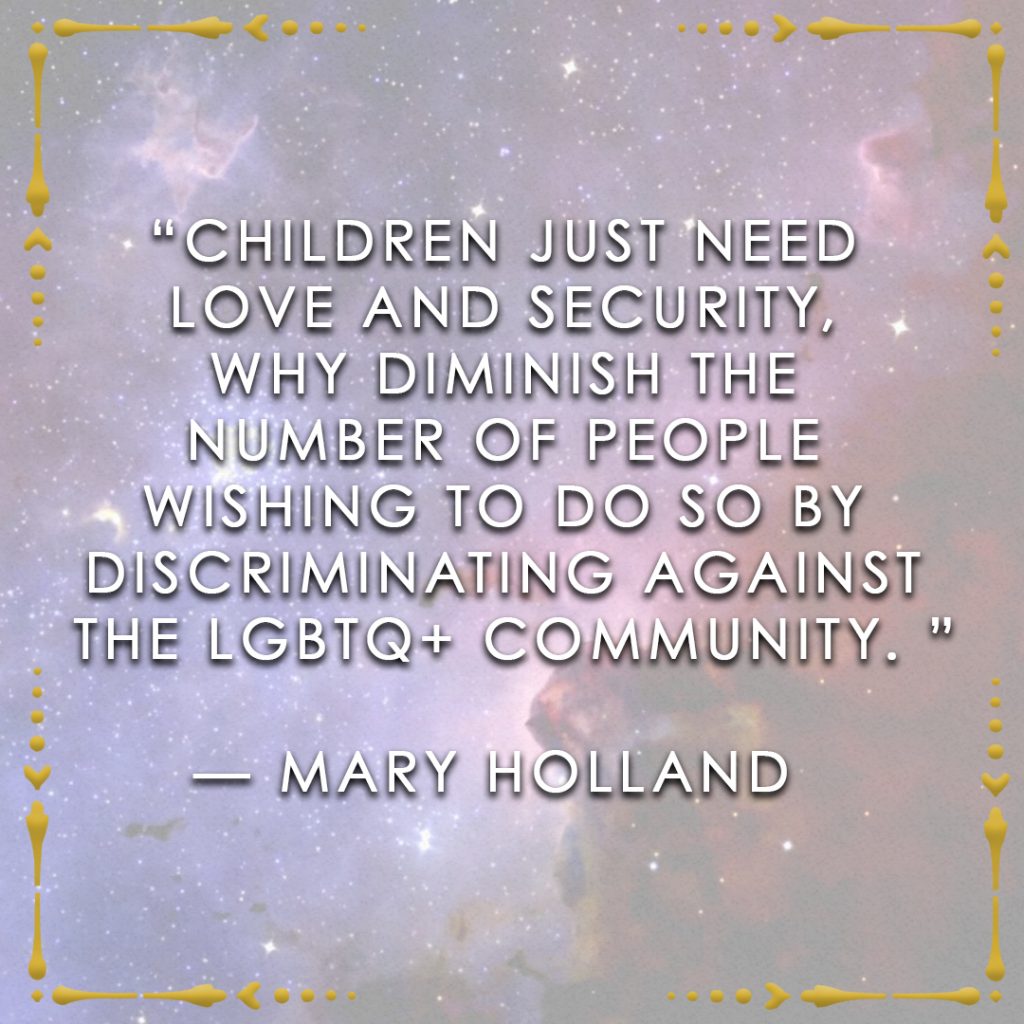
5. What is the one thing you wish to see change to further the acceptance of LGBTQ+ families and their children?
MIKAYLA DENAULT (15): I wish to see more inclusion of all peoples, and all families to teach their children the importance of listening to other opinions and loving everyone. I know stereotypes must be diminished in order for the next generations of families to encourage and support one another.
JENNY RAIN (47): There are several efforts going on in society right now to further acceptance, equality, and normalization. I work with an organization called The Reformation Project (TRP) and they are doing groundbreaking work in the church to promote full inclusion, but also to operate from an intersectional approach.
THIS is my hope with the LGBTQ+ community at large – that we will welcome those on the margins of the margins instead of excluding them. I mean gay rights started because a person of color who was a drag queen raised hell at Stonewall. The fact that it was a person of color has largely been erased from the narrative. The strongest argument that the Supreme Court heard on the marriage equality case was regarding the welfare of the children of LGBTQ+ parents (listen to entire SCOTUS case) and the voices of children were able to contribute in a meaningful way to the case turning in favor. Our fringe stories in the LGBTQ+ community MUST be reclaimed, and our separate movements MUST be combined if we are going to be able to have the impact that we want on society for gaining greater acceptance.
Let’s combine our voices and our efforts so we can create a revolution for the acceptance of LGBTQ+ families for the next generations of rainbow families. I believe this is possible in my lifetime.
MARY HOLLAND (27): My greatest hope is that the discrimination against LGBTQ+ people wanting to start a family goes away in all of America. I wish to see the United States give equal rights to LGBTQ+ individuals wishing to adopt. Children just need love and security, why diminish the number of people wishing to do so by discriminating against the LGBTQ+ community.
EMILY GRUBBS (21): I would love to see changes happen in Discrimination law. While we all are still reeling from marriage equality, the fact is that it is legal to discriminate against LGBTQ+ persons in thirty-one states. Our fight does not end with a marriage certificate; the fight can only end once everyone is truly equal.
I would also like to see the LGBTQ+ movement embrace intersectionality: LGBTQ+ members of color, trans-people, non-binary members, and homeless LGBTQ+ are all examples of members who often get left out of LGBTQ+ advocacy and do not get the support they need. White, gay men are not the only faces of the LGBTQ movement; we need our advocacy to reflect the diversity of our community.
KATE HILLYER (43): I wish more schools focused on teaching celebration of diversity of all kinds. That’s why I love the Human Rights Campaign’s Welcoming Schools program. They’ve got fantastic resources, including book lists, answers to commonly asked questions, and lesson plans, all aimed at teaching inclusion and avoiding bullying.
PERSIS TICKNOR-SWANSON (21): I want there to be all the same legal and financial rights for LGBTQ+ families as heterosexual families. LGBTQ+ families are challenging the accepted structure of how families are built and I want to see social structures change with that. Also, a gay president.
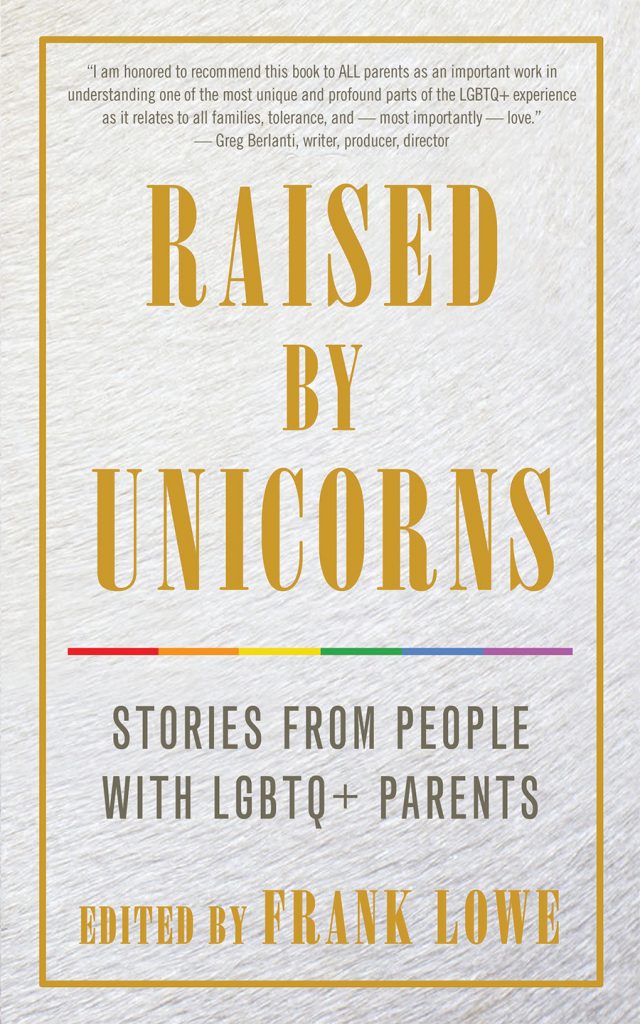 Raised by Unicorns is available for purchase at all major retailers in print and digital formats. Or, even better, buy a copy at your local independent bookstore!
Raised by Unicorns is available for purchase at all major retailers in print and digital formats. Or, even better, buy a copy at your local independent bookstore!
Amazon iTunes Barnes & Noble Google Play Kobo
Tags:
adoption,
America,
ariel chesler,
author interview,
bisexual,
Calvin Ticknore-Swanson,
children,
cleis press,
compassion,
Emily Grubbs,
Eric Tracy-Cohen,
family,
frank lowe,
gay,
gay marriage,
gay rights,
gayathomedad,
gender,
identity,
jenny gangloff rain,
jenny rain,
Joe Valentine,
Katharine Manning,
Kellen Kaiser,
kids,
Lara Lillibridge,
lesbian,
lgbt,
lgbt parenting,
lgbtq,
lgbtqi,
love,
Mary Holland,
Mikayla Denault,
nuclear family,
parenting,
Persis Ticknor-Swanson,
queer,
raised by unicorns,
raising children,
Rebecca Gorman,
Ryan Murphy,
sex,
United States